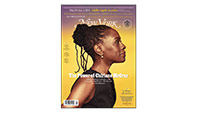
1. The cover story of our most recent issue was a profile, by Lisa Miller, of New York City’s new First Lady, Chirlane McCray, who is Mayor Bill de Blasio’s partner both at home and at City Hall (“Chirlane McCray’s City,” May 19–June 1). “McCray seems to naturally fit perfectly into both the identity and the role expected of the First Lady of New York City’s freshly progressive administration,” wrote Amanda Hess at Slate. “For other political wives around the U.S., McCray’s example provides a handy lesson: If you marry a politician, make sure it’s his career you want to support, not your own. And New York is also liberal and inclusive enough that a political wife doesn’t need to totally defang her opinions in order to succeed.” But the local tabloids were much more interested in a personal comment McCray made, acknowledging that when her first child, Chiara, was born, she had a hard time adjusting to the demands of motherhood. The New York Post headline ran “I Was a Bad Mom,” and inside, Bruce Golding wrote that McCray’s admission that she had trouble adjusting to being a parent upon the birth of Chiara was “bound to horrify most moms” and “shatters the carefully crafted image of de Blasio’s close-knit family, which helped vault him into office.” The Daily News used the slightly kinder “Didn’t Want to Be a Mom,” but that, too, angered many of the city’s liberals and mothers and even Mayor de Blasio himself, who called on both newspapers to apologize for their insensitivity. Plenty of readers agreed with him. “What is bound to horrify most mothers is the ease with which a woman who speaks with any honesty about her life is called a bad mother,” wrote Amy Davidson in a blog post for The New Yorker. “Apparently, even a mother who quits her job risks being called a bad mother if she hesitates a second too long. When McCray says that she and her husband will ‘feel guilt forever more,’ she is not admitting to something dark and awful. She is just telling a truth of parenting.” “Crazily enough, I read this as an honest assessment of the sacrifices you make when you become a mother, especially in the context of being a feminist organizer for most of your adult life,” wrote Phoenix Tso at Jezebel. “Maybe we should all just wear our poodle skirts to the sock hop and be done with this,” fumed Lizzy Ratner at The Nation’s website.

2. “Let’s, like, demolish laundry,” Jordan Metzner of laundry start-up Washio told Jessica Pressler in a story surveying the amazingly crowded and competitive laundry-app “space” that Felix Salmon called “one of the best things ever written about the latest dot-com bubble” (May 19–June 1). “Destined to become classic piece re: Silicon Valley,” wrote @jayhinman on Twitter, where the story found a rapturous audience. “The fight to ‘disrupt laundry’ as a metaphor for everything smart, silly, and sad about Silicon Valley,” tweeted the Atlantic’s Derek Thompson. “Sad, hilarious, and excellent,” added Bloomberg BusinessWeek’s editor, Josh Tyrangiel. “The 2 grafs of this @jpressler piece that start ‘Ha, yeah’ are a mini-masterpiece of tone and observation,” praised Slate’s Dan Kois. As for the laundry-disrupters themselves, Heidi Moore of the Guardian wrote, “Whatever, Silicon Valley. Call me when you can wash my dishes.”
3. “Is the very notion of a conservative comedian an oxymoron, given that comedy by definition is often the revenge of underdogs against the privileged?” asked Frank Rich in an essay about the right-wing efforts to reclaim comedy from liberal elitists like Jon Stewart and Stephen Colbert, who will succeed David Letterman on The Late Show next year (“Can Conservatives Be Funny?,” May 19–June 1). “There are ludicrous things in this life, and those are the things you laugh at,” argued one commenter on nymag.com, proposing that you can’t reverse-engineer comedy to fit some ideological purpose. “Republicans appear to take an entirely different attitude: We really, really hate liberals, therefore let’s try and find a way to laugh at them.” Others thought there was hope on the right. “The right doesn’t have a parallel to Jon Stewart or Colbert, but there is tons of genuinely funny right-wing humor,” argued one reader with an interesting sense of what counts as conservative comedy. “SNL and The Onion mock both sides but their right-wing-slanted pieces are funnier than their left-wing material. South Park rejects their right-wing affiliation, they hate Glenn Beck, and they trashed libertarian hero Ayn Rand on one episode, but much of the humor is fundamentally right wing.” As another pointed out, “the very concept of ‘late night tv hosts’ is middle America conservative. Do any of us think of Jay Leno as a liberal beacon?”
Send correspondence to: nymletters@nymag.com